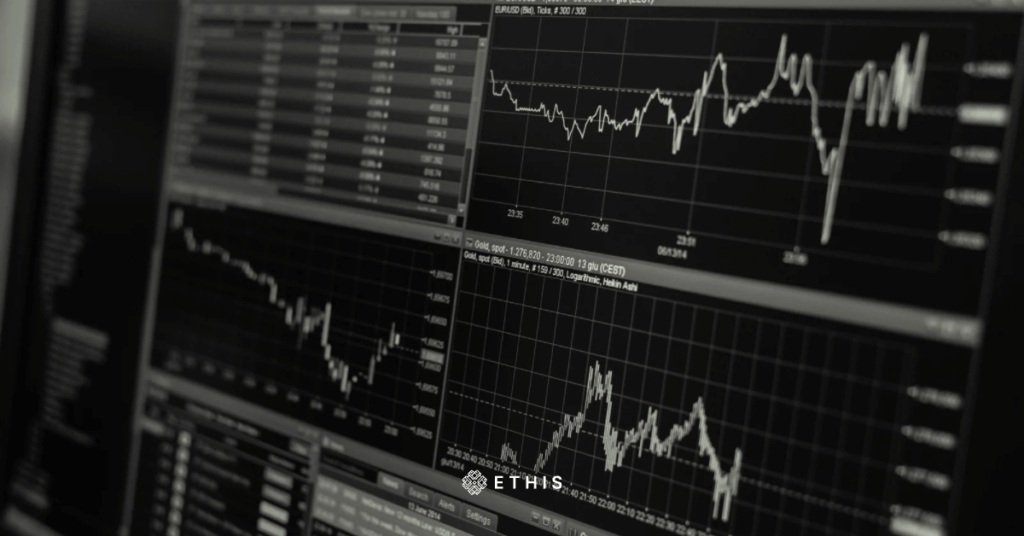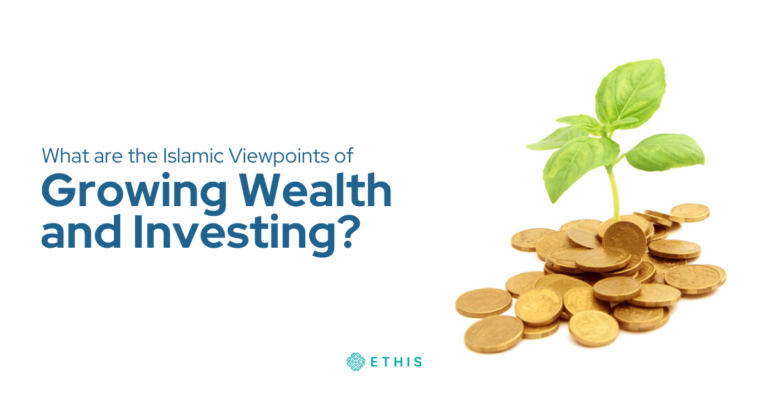
Contrary to what some may believe, Islam does not intrinsically prohibit the growing of wealth through investing. In fact, many of the Islamic teachings hone down on the multi-faceted areas of enterprise, thus guiding Muslims towards a life not absent of capitalistic opportunities.
While some faiths steer their followers completely away from materialistic viewpoints, Islam encourages (or at least does not condone) the various practices of work and trade – urging people to actively participate in life and economies to a certain degree.
However, Islamic finance and the concept of shariah-compliance are aimed at setting some ground rules for the common Muslim investor or wealth builder.
The Islamic viewpoint on financial success is not without cautionary measures, conditions and limitations. As Muslims we are not absolutely free from discipline and self-control, especially in regards to how we manage our money and grow our wealth.
Here are a few important points to understand about the Islamic viewpoints of investing for wealth.
Related – “Sukuk” A Driving Force in the Development of Islamic Finance
Types of Halal Investing


Before anything, one must delve into the basics of investing from the basis of Halal-related compliance.
Investing in enterprises, often known as equities or stocks, and fixed income assets, such as Sukuks (Islamic bonds) or real estate, are the two main categories of halal investing.
Both forms of investments must adhere to Islamic rules in order to be considered Halal. Income-based investments offer lower, more consistent returns, whereas company investments offer bigger returns but are also riskier.
Muslims and non-Muslims alike can gain from investing according to Islamic teachings. Halal investing provides a disciplined investment approach that emphasises extensive security research and monitoring. In general, the Islamic screening process involves the careful management of debt which encourages a conservative approach that attracts risk-averse investors.
Short-term speculation is not allowed in halal investing, and some Islamic scholars consider high portfolio turnover rates (frequent trading) to be gambling.
Low turnover lowers portfolio trading costs, including broker commissions, while also reducing tax liability by avoiding taxable capital gains from rapid stock purchases and sales.
Deliberate restrictions (for a reason)


The restrictions imposed by Islamic beliefs on investment opportunities may constitute a risk. For example, a month’s analysed assets may pass the initial halal screening requirements, but due to the limited investment options, a halal portfolio may not be as diverse as conventional portfolios, therefore increasing the risk of loss. The returns from various market sectors rise and fall at different times.
When prohibited market sectors, such as financial services, experience a resurgence, Islamic principles may limit profit prospects. Halal cash reserves cannot be invested in standard money market funds or deposited in an interest-earning bank account since Islamic rules prohibit the use of interest-paying assets. As a result, they do not earn revenue.
Shariah finance law is based on the principles of social justice, ethics, and the use of money to help communities grow. Partnerships that are mutually financially advantageous should be the emphasis for any Muslim exploring halal investing techniques.
If Muslim investors want to invest in halal products, they must follow shariah law’s rules and requirements. Compliance with Islamic finance principles, according to shariah rules, leads to a more ethical and just society.
This goes against the popular belief in the West that the ultimate goal of investors is to make money. While Islamic finance does not restrict the production of money, it does emphasise ethics and justice in order to achieve a balance between religion, family, life, intellect, and property.
Encouraging ethical ways of wealth building


Those looking for a way to make money should consider halal investing. Islamic finance does not only impose any restrictions or limitations; rather, it promotes ethical behaviour and mutual gain. Muslims are encouraged to invest wisely and ethically through halal investments.
With the correct investments, it is still possible to gain money ethically. Investing in shariah-compliant products can help investors decrease risk, and it’s one of the reasons Islamic banks were able to weather the 2008 financial crisis.
It’s vital to save for the future, but it’s also crucial to stay true to your ideals.
In essence, halal investing refers to any investment that is not prohibited by shariah law. Haram investments include: illegal activities including alcohol, cigarettes, and gambling; riba and unjust gains that could be used to exploit others; and any investments with a high level of risk.
Many ordinary items are not halal, including many mainstream ethical funds and many Muslims who invest in haraam products unwittingly or intentionally.
However, in asset classes such as equities, gold, art, startup investing, and even property, there are a plethora of halal possibilities accessible on the market.
While there are many other types of investments accessible in most developing parts of the world, stocks and bonds are the most frequent publicly traded investments. Let’s begin with those.
Stocks are ownership shares in a publicly traded firm that include a claim to a portion of the company’s assets and profits. When you buy a stock, you are purchasing a small piece of the company. When the value of a firm rises or falls, the value of your stock investment rises or falls with it.
Any money you gain from a stock originates from the company’s operations, thus Muslim investors are usually interested in learning how the company functions and earns money. Because stocks are part of the “equity” market, they are also known as “equities.”
Bonds are debt ownership shares that pay interest and are typically issued by a government, city, or company. When you purchase a bond, you are purchasing a small portion of the debt and will be receiving repayments, including interest, depending on that ownership.
Islamic bank deposits and sukuk are non-interest bearing alternatives to standard bonds. Bonds are considered conservative investments because they are part of the “fixed-income” market.
Riba and bonds


Riba is one of the most frequently misunderstood terms in Islamic finance, but it is critical to the appropriate application of Islam in our financial lives. The Quran, Prophet Muhammad’s (ﷺ) sunnah, and the consensus of the scholarly community all forbid riba.



What exactly do we mean when we say riba in Arabic? Although it is typically translated as “usury,” the actual definition of the term is “increase, addition, or growth.” Usury is often thought of as charging an extortionate rate of interest by English speakers.
However, riba refers to any excess value in transactions that is prohibited under Islamic shariah, or sacred law.
Riba al-nasee’ah is one of the most common types of riba acknowledged by all Muslim scholars. This is the only type of riba described in the Quran, and it is widely regarded as the most destructive and unethical of all. Simply expressed, riba al-nasee’ah refers to a rise in the value of a commodity as a result of the passage of time.
Interest-bearing bonds are included in this category. As a result, most bonds are considered unsuitable investments for Muslims. However, there are new options on the market that might help investors satisfy their needs.
Shariah standards reinforced by AAOIFI


You might be wondering how financial tests are calculated and which lines of operation are prohibited. In 1990, the Accounting and Auditing Organization for Islamic Financial Institutions (AAOIFI) was founded as a global organisation to assist with this.
The shariah advisory board of AAOIFI is made up of Islamic scholars, notably those with a strong experience in trade and transaction fiqh (jurisprudence). They come from all over the world and represent many schools of thought to create international Islamic finance standards.
Using the AAOIFI criteria can help you guarantee that your assets are truly Islamic. They’re a terrific technique to help determine if your investments are halal when combined with advice from a qualified advisor.
Stocks that are Halal


Most shariah experts agree that a two-step screening method is the most effective way to determine compliance with Islamic financial transaction principles:
- The company’s lines of business are scrutinised qualitatively: Scholars and fund managers seek for any signs that the company is involved in illegal business or other crimes.
- Quantitative: The business must also pass a number of financial exams. It can’t, for example, have too much debt on its books.
These two procedures are the most important in the process of locating halal stocks and mutual funds. It’s important to remember that just because a firm has a halal line of business doesn’t mean it’s halal to invest in it. It could also have a subsidiary line of business that engages in Islamically prohibited activities above a particular threshold, or it could have too much debt or interest income.
We would advise people interested in investing to talk with an Islamic finance practitioner for further information on both the quantitative and qualitative screens, as well as the necessity of paying zakah and purifying.
What is a shariah-based Unit Trust, and how does it work?


A shariah-compliant collective investment vehicle, a shariah-based unit trust allows participants with comparable investing objectives to pool their funds together.
Professional fund managers will invest this money in a shariah-compliant portfolio of securities in accordance with the fund’s aim and investment plan.
Shariah-based investment attempts to achieve the goals of increasing human happiness and preventing harm by maintaining religion, life, intelligence, future generations’ interests, and money.
This year, assets devoted to sustainable investments have increased significantly, particularly in light of the COVID-19 pandemic. It has caused investors to reconsider the necessity of being sustainable in what we do and how we invest, as well as a greater attention on the investment community’s social responsibility.
With the disruption of our daily routines, from where we go to how we connect with people, comes the opportunity to rethink what is possible in order to create a better world for future generations.
According to a poll performed by State Street Global Advisors, 80 percent of institutional investors prefer to include environmental, social, and governance (ESG) elements in their investment plans.
The world is now looking for and investing in businesses that consider not only shareholder returns but also environmental and social consequences. Asia, in particular, has made significant strides in the areas of ESG and sustainability.
In line with new social and sustainable efforts


The similarities between shariah investment and sustainable investing are obvious; both types of investing have the same goal of doing good — one from a religious standpoint and the other from a social responsibility standpoint.
However, it may be possible to combine complementary approaches which will result in a stronger portfolio for long-term investors, and shariah-based investing is a natural fit for investors who want to make a positive impact, as both shariah principles and sustainable investing encourage governance, stewardship, and value creation. In shariah-based investing, interest, security lending, and short-selling are all prohibited.
Negative screening is used to rule out industries like tobacco, alcohol and breweries, guns and munitions, and other non-halal items. Through the use of ESG in the investment process, shariah principles are further supplemented with sustainable investing.
ESG uses positive screening to identify the best-performing businesses that provide environmentally friendly products and services or engage in socially responsible business practises.
These businesses are thought to be more robust and well-prepared to face future problems, outperforming their broader market peers in the future while allowing investors to link their investments with the United Nations Sustainable Development Goals (UN SDGs).
The truth of Islam represents a timeless and effective method of managing life in many different aspects. With that, the growth and development of investing portfolios and building wealth are not impossible, but it will take good self-control and discipline as well as the ability to abide by many compliance factors and commitment levels to truly achieve a well-rounded Islamic viewpoint on finance.





Top Posts
Islamic P2P Crowdfunding Explained
How to Earn Halal Money? The Money Mindset
Halal Investments for Singapore Muslims? It’s time for a shake-up in the Islamic Investments scene.
Smart investment for making Halal money
3 Reasons Why Property Crowdfunding is the Smart Investment for You